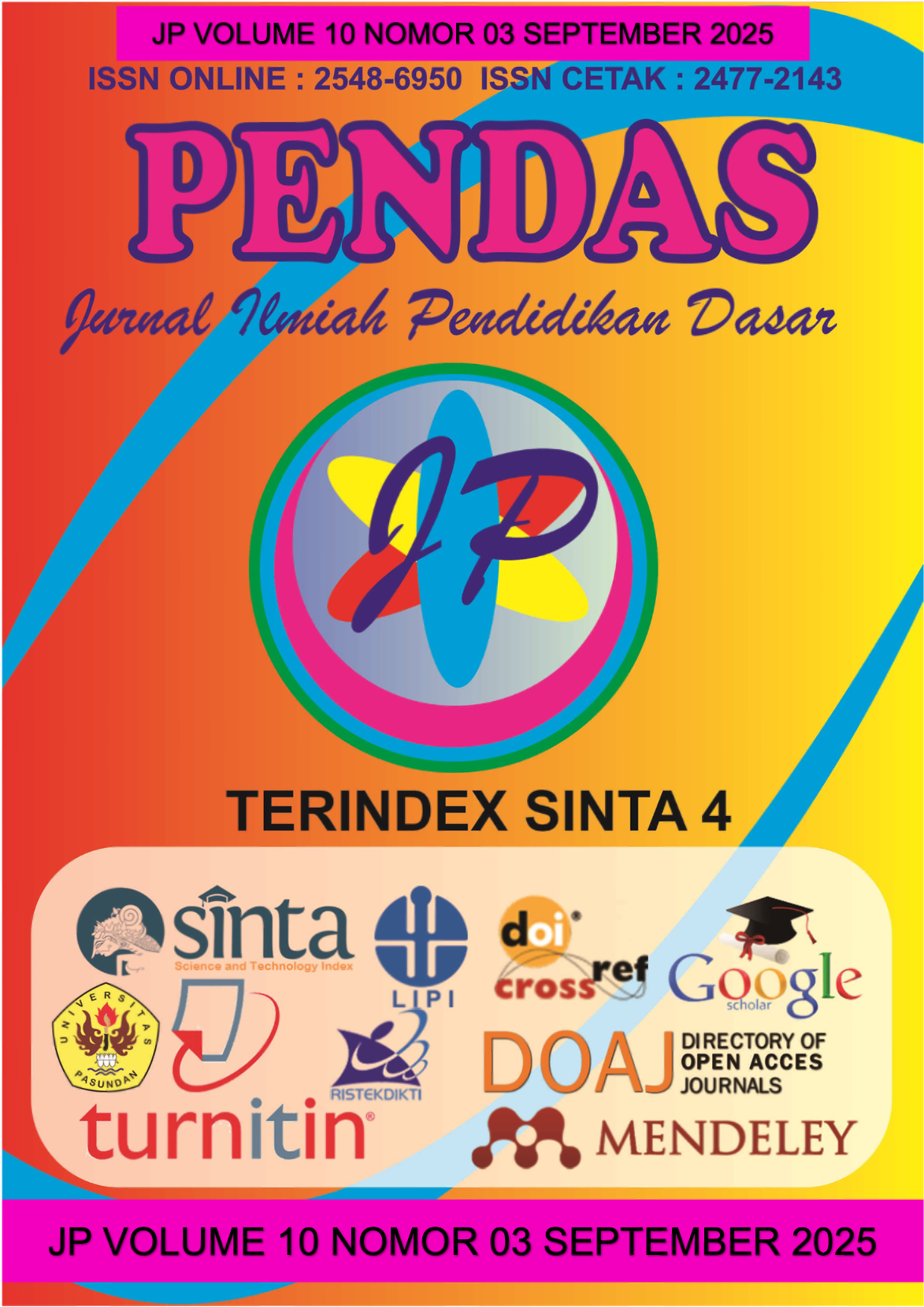ADAPTING RECIPROCAL TEACHING STRATEGY TO IMPROVE EFL STUDENTS’ READING COMPREHENSION: A CASE STUDY AT JUNIOR SECONDARY LEVEL
DOI:
https://doi.org/10.23969/jp.v10i03.29488Keywords:
EFL students, qualitative study, reading comprehension, Reciprocal Teaching Strategy, secondary educationAbstract
This study investigates the implementation of the Reciprocal Teaching Strategy (RTS) to enhance reading comprehension among EFL students at the junior secondary level. Reciprocal Teaching Strategy incorporates four main strategies—predicting, questioning, clarifying, and summarizing—to promote metacognitive awareness and collaborative learning. Employing a qualitative case study design, this research was conducted at a public junior high school in Karawang, Indonesia. Data were collected through classroom observation, semi-structured interviews with one English teacher and three students, and documentation analysis. The findings reveal that Reciprocal Teaching Strategy was implemented through guided modeling, group roles, and repeated practice, resulting in improved student participation and comprehension, especially during predicting and clarifying activities. However, challenges emerged, including students’ unfamiliarity with reflective strategies, varied proficiency levels, and limited classroom resources. Despite these obstacles, the teacher’s adaptive approach contributed significantly to the effectiveness of Reciprocal Teaching Strategy. This study highlights the importance of strategic scaffolding and role assignment in EFL reading instruction. It also provides insights for practitioners seeking to apply Reciprocal Teaching Strategy in similar contexts.
Downloads
References
Abdullah, I., Dai, S., Negeri, S., & Utara, B. (2023). Enhancing The Students’ Ability in Reading Comprehension Through Reciprocal Teaching Strategy. 2(5). https://doi.org/10.59188/jcs.v2i5.346
Badakhshan, S., Motallebzadeh, K., & Maftoon, P. (2021). Reflective Reciprocal Teaching: A Technique for Improving Iranian EFL Learners’ Reading Comprehension Ability. International Journal of Foreign Language Teaching and Research, 9(38), 39–63. https://doi.org/10.52547/jfl.9.38.39
Bilici, Ö. U., & Subaşı, G. (2022). EFL Learners’ Metacognitive Awareness of Global Reading Strategies and L2 Reading Comprehension Skills: The Efficacy of Reciprocal Teaching. In The Reading Matrix: An International Online Journal (Vol. 22, Issue 2). DOI: not available.
Brown, H. D. (2007). Teaching by principles: An interactive approach to language pedagogy (3rd ed.). White Plains, NY: Pearson Education.
Decristan, J., Bertram, V., Reitenbach, V., Schneider, K., Köhler, C., & Rauch, D. P. (2022). Linguistically responsive reciprocal teaching in primary school: effectiveness of an intervention study on students’ Reading competence. Journal of Multilingual and Multicultural Development. https://doi.org/10.1080/01434632.2022.2141757
Dew, T. P., Swanto, S., & Pang, V. (2021). The Effectiveness of Reciprocal Teaching as Reading Comprehension Intervention: A Systematic Review. Journal of Nusantara Studies (JONUS), 6(2), 156–184. https://doi.org/10.24200/jonus.vol6iss2pp156-184
Flavell, J. H. (1979). Metacognition and cognitive monitoring: A new area of cognitiveu2028developmental inquiry. American Psychologist, 34(10), 906–911. https://doi.org/10.1037/0003-066X.34.10.906
Grabe, W., & Stoller, F. L. (2002). Teaching and researching reading. Harlow, UK: Pearson Education.
Habók, A., Magyar, A., & Hui, S. K. F. (2019). The effects of EFL reading comprehension and certain learning-related factors on EFL learners’ reading strategy use. Cogent Education, 6(1). https://doi.org/10.1080/2331186X.2019.1616522
Harvey, S., & Goudvis, A. (2007). Strategies that work: Teaching comprehension for understanding and engagement (2nd ed.). Stenhouse Publishers.
Kula, S. S. (2021). The effects of reciprocal teaching on the perceived reading comprehension self-efficacy of 2nd-grade pupils: Reflections of the pupils and their teacher. African Educational Research Journal, 9(3), 679–686. https://doi.org/10.30918/AERJ.93.21.102
Lopez, M. K. R. R., & Ortega-Dela Cruz, R. A. (2022). Gallery Walk technique in enhancing reading comprehension and oral English language proficiency of junior high school students. Waikato Journal of Education, 27(3), 57–71. https://doi.org/10.15663/wje.v27i3.813
Nuvianto, E., Azis, A., Yusanti, G., & Kediri, I. (2020). Increasing Students’ Reading Comprehension Skill by Using Written Text Book. https://doi.org/10.29407/jetar.v5i2.14500
Oczkus, L. D. (2018). Reciprocal teaching at work: Powerful strategies and lessons for improving reading comprehension (3rd ed.). Alexandria, VA: ASCD.
Oo, T. Z., Magyar, A., & Habók, A. (2021). Effectiveness of the reflection-based reciprocal teaching approach for reading comprehension achievement in upper secondary school in Myanmar. Asia Pacific Education Review, 22(4), 675–698. https://doi.org/10.1007/s12564-021-09707-8
Palincsar, A. S., & Brown, A. L. (1984). Reciprocal teaching of comprehension-fostering and comprehension-monitoring activities. Cognition and Instruction, 1(2), 117–175. https://doi.org/10.1207/s1532690xci0102_1
Rojabi, A. R. (2021). Exploring Reciprocal Teaching Method on EFL Learners’ Reading Comprehension. VELES Voices of English Language Education Society, 5(2), 132–142. https://doi.org/10.29408/veles.v5i2.3860
Snow, C. E. (2002). Reading for understanding: Toward a research and development program in reading comprehension. Santa Monica, CA: RAND Corporation.
Sung, Y.-T., Chang, K.-E., & Yang, J.-M. (2019). How effective are mobile devices for language learning? A meta-analysis. Educational Research Review, 31, 100–119. https://doi.org/10.1016/j.edurev.2020.100337
Sung, Y.-T., Chang, K.-E., & Yang, J.-M. (2019). The effect of reciprocal teaching on reading comprehension in a computer-supported collaborative learning environment. Interactive Learning Environments, 27(4), 564–579. https://doi.org/10.1080/10494820.2018.1522654
Vygotsky, L. S. (1978). Mind in Society: The Development of Higher Psychological Processes. Cambridge, MA: Harvard University Press.
Downloads
Published
Issue
Section
License
Copyright (c) 2025 Pendas : Jurnal Ilmiah Pendidikan Dasar

This work is licensed under a Creative Commons Attribution 4.0 International License.














































